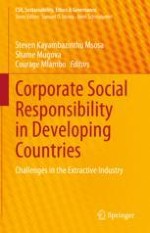This book examines corporate social responsibility theories and models in the context of developing countries. The developing countries are amongst the poorest countries of the world despite vast natural resources. The natural resources are mismanaged, proceeds are misappropriated, corruption and conflict are centered on resource control. Governments and Multinational Corporations (MNCs) are at the centre of the controversy of corporate social responsibility (CSR) in the affected countries. Moreover, the lack of systems, procedures and legislation to enforce CSR has led to environmental degradation and a decline in business ethics and morality.
This book analyses Corporate Social Responsibility in developing countries with specific reference to the extractive industry by integrating academic and industrial perspectives. It will be of interest to researchers in the field of CSR, as well as for management professionals.
